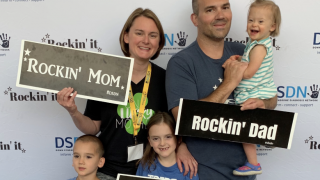Learning the Latest; Gaining Empowerment
Published on
Trisomy 21 UpdatePublished on
Trisomy 21 Update The annual National Down Syndrome Congress (NDSC) Convention provides an opportunity for parents and family members, self-advocates, community advocates and professionals to learn the latest information on Down syndrome from internationally known experts. In addition to workshops, the convention hosts several social and networking events.
The annual National Down Syndrome Congress (NDSC) Convention provides an opportunity for parents and family members, self-advocates, community advocates and professionals to learn the latest information on Down syndrome from internationally known experts. In addition to workshops, the convention hosts several social and networking events.
Together, these experiences culminate with both attendees and presenters feeling empowered to continue their work as parents or professionals to ensure that all individuals with Down syndrome reach their full potential with equal rights and opportunities.
The Children's Hospital of Philadelphia (CHOP) was well represented at the 47th Annual NDSC Convention, “Rivers of Opportunity,” which took place June 27–30 in Pittsburgh, PA. Numerous patient families from CHOP's Trisomy 21 Program attended, including three that shared their experiences: Kristin Steffen, mother of Lila, age 2; Helen Milligan, a CHOP physical therapist and mother of Aidan, 16; and Yacine Moueddene, 29, a self-advocate with DS. Read their stories.
Team members from the T21 Program and their associates were also chosen to present. Here are summaries of their presentations:
Michelle Hagenbaugh, MS, OTR/L, and Helen Milligan, PT, MPT, shared the benefits of the Trisomy 21 Program’s aquatic therapy groups at CHOP. The groups, for children from 10 months to 6 years old and their caregivers, are in their eighth year and have been a huge success.
With photos and videos, the duo highlighted the fun activities and basic routine used during the group pool sessions. Parents learn how they can easily carry over the same activities in their personal or community pool. Presenters showed how skills facilitated and gained in the pool can be translated to functional routines and activities on land.
Those with Down syndrome can benefit from using the pool from infancy through adulthood as a fun way to exercise, gain new functional skills and promote independence. Helen’s son, Aidan, has Down syndrome and is currently a member of his high school swim team. She shared her personal insight on how swimming has helped him stay fit, healthy and included in high school.
Mary Pipan, MD, and Milligan shared how they help families address nutrition, GI motility and constipation interventions as part of the comprehensive T21 clinic evaluation. The program prepares the child and family for toilet training with:
Families of children with Down syndrome who were also diagnosed with autism spectrum disorder (ASD) — about 15% — face additional developmental and behavioral challenges that often require additional advocacy, for both home and school-based services.
Dr. Pipan, Audrey Vincent, MSW, LSW, and Diane Perry, a parent adviser with the PEAL Center, spoke about the diagnosis of ASD in children with T21, identifying the individual strengths and challenges in dually diagnosed patients, and how these inform building an individualized educational and therapeutic support plan for each child.
They also discussed how advocacy — from an interdisciplinary team that includes physicians, social work and outside networks — helps families navigate support systems in the settings of home, community and school, including transitions from pre-K to school, into middle and high school and then into adulthood. The goal: supporting individuals so they can reach their maximum potential.
Categories: Trisomy 21